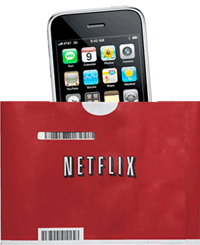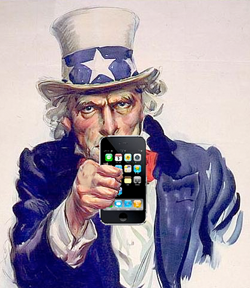 At the moment, Apple’s tablet is not a real product but a gumbo of rumor, speculation, patent diving, and unabashed daydreaming. But it’s already inspiring a thoughtful backlash. Over at IntoMobile, Stefan Constantinescu lays out in amazing detail the history of rumors about an Apple tablet that turned out to be pure fiction, or which at least haven’t resulted in Apple releasing such a device to date. It’s a sobering and useful piece, especially given that there’s some chance that the Apple device that pretty much everyone is now assuming will appear soon may indeed be nothing more than the result of mass hallucination.
At the moment, Apple’s tablet is not a real product but a gumbo of rumor, speculation, patent diving, and unabashed daydreaming. But it’s already inspiring a thoughtful backlash. Over at IntoMobile, Stefan Constantinescu lays out in amazing detail the history of rumors about an Apple tablet that turned out to be pure fiction, or which at least haven’t resulted in Apple releasing such a device to date. It’s a sobering and useful piece, especially given that there’s some chance that the Apple device that pretty much everyone is now assuming will appear soon may indeed be nothing more than the result of mass hallucination.
At LIVEdigitally, my friend Jeremy Toeman isn’t saying that the Apple tablet is fantasy–but he does contend that such devices would be rife with limitations and that they would join the giant deadpool comprised of products which the industry got excited about but real people had no interest in. It’s certainly true that there’s a long history of tablets being released and then failing miserably. The image at the left is the Momenta tablet computer, which was a big story and a major flop back when I got into the tech-journalism business in 1991. And if you were going to compile a list of Microsoft’s five biggest misfires, it might well include the whole idea of the Tablet PC, a platform which Microsoft representatives told me at Comdex in 2001 would make up the majority of notebook computers sold within five years. Tablets not only don’t dominate, but are pretty much moribund. (Even in 2001, I thought they’d drunk an entire vat of their own Kool-Aid.)
Every tablet computer we’ve seen to date has suffered from being…a computer. That is, they’ve taken many of their basic design concepts from standard laptops, borrowed much of their user interfaces from traditional operating systems, and generally been intended for applications we know from traditional computing, such as note-taking. Basically, they’ve proven again and again that pen and/or touch input doesn’t provide a very satisfactory substitute for plain old physical QWERTY.
If Apple is releasing a tablet anytime soon, however, I think it’ll be smart enough not to offer us something that has much of anything in common with Microsoft’s Tablet PC design and other existing tablet concepts. The Apple tablet won’t use a pen, won’t repeat the Newton’s handwriting-recognition mistakes, and won’t be pitched as being very useful for taking notes or engaging in other text-intensive tasks. It’ll be an iPhone (or iPod Touch if you prefer) with more real estate–a gizmo optimized for listening to music, watching movies, reading Web pages and other content, playing games, and other activities that involve minimal input.
The iPhone and iPod Touch have shown that the basic idea not only works but is hugely appealing. It’s still not a given that enough people want similar functionality in a larger size enough to add another gadget to their lives–especially a $700 or $800 gadget. But if Apple really is readying a tablet (not a given) and it’s a giant iPhone rather than a “tablet computer” (also not a given, but I have my hunch) it could be something utterly new: a tablet that makes sense.

 Hey, let’s try something new–a fresh T-Poll (powered by the
Hey, let’s try something new–a fresh T-Poll (powered by the  At the moment, Apple’s tablet is not a real product but a gumbo of
At the moment, Apple’s tablet is not a real product but a gumbo of  Rumor has it that
Rumor has it that  After three years as a member of Apple’s board, Google CEO Eric Schmidt
After three years as a member of Apple’s board, Google CEO Eric Schmidt  People keep saying that there’s no court of last resort when Apple rejects an iPhone application. Heck, nobody can even demand that Apple explain its actions. But the one guy who can order even Steve Jobs around is Uncle Sam. And the FCC is now
People keep saying that there’s no court of last resort when Apple rejects an iPhone application. Heck, nobody can even demand that Apple explain its actions. But the one guy who can order even Steve Jobs around is Uncle Sam. And the FCC is now 